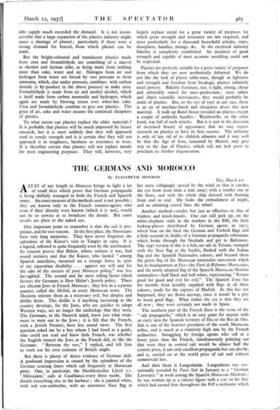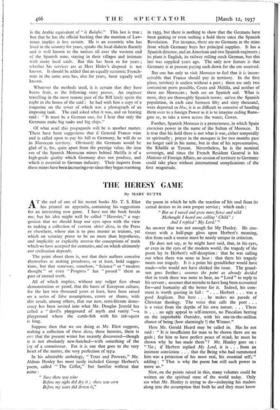THE GERMANS AND MOROCCO
ELIZABETH MONROE By
Fez, March Ist.
A STAY of any length in Morocco brings to light a lot of small facts which prove that German propaganda is being skilfully managed in both the French and Spanish zones. An exact measure of the methods used is not possible ; they are known only to the French counter-agents who even if their identity were known (which it is not), would not be so unwise as to broadcast the details. But some results are plain to the naked eye.
One important point to remember is that the soil is pro- pitious, and for two reasons. In the first place, the Moroccans have very long memories. They have never forgotten the splendour of the Kaiser's visit to Tangier in 1905. It is a legend, referred to quite frequently even by the uneducated. Its renown proves that Billow, whose venture it was, had sound instincts and that the Kaiser, who landed " among Spanish anarchists, mounted on a strange horse in spite of my equestrian disability . . . against my will and for the sake of the success of your Morocco policy," was less far-sighted.. The second and far more telling factor which favours the Germans is Herr Hitler's Jewish policy. There are 160,00o Jews in French Morocco ; they live in a separate quarter, called the Mellah, in every Moroccan town. The Moslems tolerate them as a necessary evil, but despise and dislike them. This dislike is if anything increasing as the country develops, for the Jews, who are quicker to adopt Western ways, are no longer the underdogs that they were. The Germans, to the Moorish mind, know just what treat- ment to mete out to the Jews ; it is felt that the French, with a Jewish Premier, have less sound views. The first question asked me by a boy whom I had hired as a guide, who could- not read and knew little French, was whether the English treated the Jews as the French did, or like the Germans. " Between the two," I replied, and left him to work out his own estimate of British might.
But there is plenty of direct evidence of German skill. A profound impression is caused by the splendour of the German cruising liners which call frequently at Moroccan ports. One, in particular; the Norddeutscher Lloyd s.s. ` Milwaukee,' calls at Casablanca every three weeks. She dwarfs everything else in the harbour ; she is painted white, with red sun-umbrellas, with an enormous Nazi flag at her stern (obligingly spread by the wind so that it catches the eye from more than a mile away) with a smaller one at the bows, and with the whole ship dressed with bunting from end • to end. She looks the embodiment of might, and an admiring crowd lines the wharf Another method—cruder but just as effective—is that of trinkets and knick-knacks. One can still pick up, on the white-elephant stalls in the markets in the Riff, the little looking-glasses distributed by German agents in 1917, which bear on the back the German and Turkish flags and a little account in Arabic of a German propaganda submarine which broke through the blockade and got to Baltimore. The 1937 version of this is a belt, on sale in Tetuan, stamped with the Nazi flag at the buckle, flanked with the Italian flag and the Spanish Nationalist colours, and beyond them the green flag of the Moroccan nationalist movement which has its headquarters at Fez—the Parti de Reformer Marocaines, and the newly adopted flag of the Spanish Moroccan Moslem nationalists—half black and half white, representing " Return good for good and evil for evil." The Spanish Zone has for months been lavishly supplied with flags in all these colours, ready for the capture of Madrid. As this has not happened, they are flown anyway, since it would be a pity to waste good flags. What strikes the eye is that they are all new ; they were certainly not made in Spain.
The southern part of the French Zone is the scene of the " salt propaganda," which is an easy game for anyone with an entry into the Spanish territory of Ifni or the Rio de Oro. Salt is one of the heaviest purchases of the south Moroccan tribes, and is taxed at a relatively high rate by the French authorities. Smuggling by foreign agents who sell at a lower price than the French, simultaneously pointing out that were they in control salt would be almost half the current price, is not only excellent propaganda but can also be, and is, carried on at the world price of salt and without commercial loss.
And then there is Langenheim. Langenheim was sen- sationally revealed by Paris Soir in January as a " German Lawrence " at work among the Spanish Moroccan Moslems ; he was written up as a sinister figure with a scar on his face which had earned him throughout the Riff a nickname which is the Arabic equivalent of " le Balafre." This last is true ; but that he has the official backing that the mention of Law- rence implies is less certain. He is an eccentric who has lived in the country for years, speaks the local dialects fluently and is well known to the natives all over the western end of the Spanish zone, staying in their villages and intimate with many local caids. But this has been so for years ; whether his services are at Herr- Hitler's disposal is not known. It should be added that an equally eccentric French- man in the same area has, also for years, been equally well known.
Whatever the methods used, it is certain that they have borne fruit, as the following story proves. An engineer travelling in the most remote part of the Riff lately spent the night in the house of the caId ; he had with him a copy of a magazine on the cover of which was a photograph of an imposing tank. The caid asked what it was, and on hearing said : " It must be a German one, for I hear that only the Germans make big tanks and big ships."
Of what avail this propaganda will be is another matter. There have been suggestions that if General Franco wins and is called upon to pay his bill to Germany, he will do so in Moroccan territory. Obviously the Germans would be glad of it, for, quite apart from the prestige value, the iron ore of the Spanish Moroccan mines behind Melilla is of a high-grade quality which Germany does not produce, and which is essential to German industry. Their imports from these mines have been increasingever since they began rearming in 1933, but there is nothing to show that the Germans have been gaining or even seeking a hold there since the Spanish Revolution. For instance, there are no Germans at the mine from which Germany buys her principal supplies. It has a Spanish director, and an American and two Spanish engineers ; its plant is English, its railway rolling stock German, but this last was supplied years ago. The only new feature is that Germany is at present paying cash down for the ore received.
But one has only to visit Morocco to feel that it is incon- ceivable that Franco should pay in territory. In the first place, territory is useless without a port ; there are only two convenient ports possible, Ceuta and Melilla, and neither of these are Moroccan ; both are on Spanish soil. What is more, they are thoroughly Spanish towns; un'.ess the Spanish population, in each case between fifty and sixty thousand, were deported en bloc, it is as difficult to conceive of handing them over to a foreign Power as it is to imagine ceding Rams- gate or, to take a town across the water, Cowes.
Further, Spanish Morocco is a protectorate, in which Spain exercises power in the name of the Sultan of Morocco. It is true that his hold there is not what it was, either temporally or spiritually ; prayer in the mosques is for two months past no longer said in his name, but in that of his representative, the Khalifa at Tetuan. Nevertheless, he is the nominal sovereign, and since the French Resident General is his Minister of Foreign Affairs, no cession of territory to Germany could take place without international complications of the first magnitude.















































 Previous page
Previous page